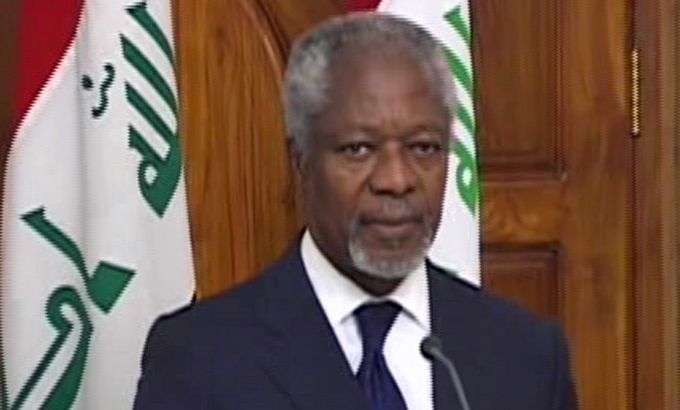Annan urges end to Syria pockets of violence
International envoy says a new approach to end violence will focus on “pockets of violence”.

UN and Arab League peace envoy Kofi Annan has said that top-level talks with the Syrian leadership have failed and that a new approach, focusing on pockets of violence and building “from the ground up rather than the other way around”, is needed to stop the fighting.
“We’ve tried it at the national level on the 12th of April and it didn’t hold,” Annan told journalists in Baghdad in a short briefing in the heavily fortified Green Zone after meeting Iraqi Prime Minister Nouri al-Maliki on Tuesday.
Annan said he would brief the UN Security Council on Wednesday on the Syria crisis, pointing out that the primary aim should be containing the violence in order to enable talks to begin between the conflicting sides.
“When I was in Damascus we did discuss with the president [Bashar al-Assad] the need on being creative in stopping the violence,” Annan said.
“Now there are serious pockets of violence around … and it is suggested we work with them to end the violence in each of the pockets and build it from the ground up rather than the other way around. And I believe where there is will and everyone works on it seriously it could work.”
He has declined to reveal details of the new approach, saying he must first talk to the Syrian opposition.
‘Iran can play a role’
Annan’s visit to Iraq – his first in his role as UN and Arab League peace envoy – comes after trips to Tehran and Damascus earlier in the week.
|
|
| UN-Arab envoy seeks Iran’s help in Syria |
After talks in Tehran with Foreign Minister Ali Akbar Salehi, Annan warned of a disaster if his peace plan fails.
“There is a risk that the situation in Syria gets out of hand and spreads to the region,” Annan told a joint news conference with Salehi, who hailed Annan’s “neutrality”.
Annan also said that Tehran, a close ally of Damascus, “can play a positive role,” and that he would continue to work with the Iranian leadership to resolve the crisis.
Activists say the violence in Syria has killed more than 17,000 people since the uprising began in March 2011.
Annan presented a peace plan earlier this year, calling for a Syrian-led political transition and an end to all violence.
Government forces and rebels have widely disregarded a ceasefire that was to begin in April, and spreading violence has prevented nearly 300 UN observers monitoring from operating.
Defiant opposition
Meanwhile, Russia said on Tuesday that it wanted to host a new meeting of foreign powers on the Syria crisis but stressed that the talks should not decide Assad’s fate.
Deputy Foreign Minister Mikhail Bogdanov also said an attempt in Geneva late last month to save Annan’s peace plan needed to be continued with the involvement of countries such as Iran, which both Washington and European powers strongly oppose.
But the opposition Syrian National Council (SNC) said its priority was to “work for the fall of the Assad regime and all its symbols,” insisting there could be no political transition until the embattled president’s departure.
The opposition coalition’s new leader, Abdel Basset Saida, is due in Moscow on Wednesday at the foreign ministry’s invitation, the SNC said.
Defence analyst Pavel Felgenhauer told Al Jazeera that Russia’s stance would keep much of the current regime in place.
“The basic (position) has not changed and it’s supporting ‘The Annan Plan’, which, basically, from the Russian point of view is a kind of compromise ha would keep in power, more or less, the present Syrian military and intelligence community with which Russia has very close relationships,” said Felgenhauer.
Russia was sending a flotilla of six warships to its naval base at Syria’s port of Tartous, the Interfax news agency reported on Tuesday, citing a military source.
The source said the flotilla’s deployment would last until the end of September and “was not linked to the escalation of the situation in Syria.”
Moscow arms export officials said on Monday that Russia will not supply new weapons to Syria
Lebanon, meanwhile, began reinforcing its border with Syria following a series of deadly attacks, a military spokesman said in Beirut.
Syrian troops traded gunfire with men overnight in the border area and shells fell inside Lebanon, wounding civilians, the army said, just two days after border clashes killed two girls.
Syrian state news agency SANA confirmed the violence and said troops foiled attempts by “armed terrorist groups” to infiltrate from Lebanon during the night.